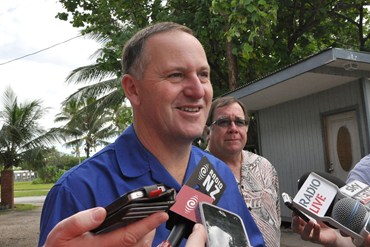 Tomorrow, in the Appeal Court in Wellington (pdf), Justices Harrison, French and Miller will hear argument in the case of the NZ Climate Science “Education” Trust (NZCSET) versus the National Institute for Water and Atmospheric Research (NIWA), in the continuing effort of the cranks to litigate away warming in New Zealand over the last 150 years. According to the man who kicked off the whole process, Richard Treadgold of the “Climate Conversation” web site, the NZCSET bases its appeal on two main points:
Tomorrow, in the Appeal Court in Wellington (pdf), Justices Harrison, French and Miller will hear argument in the case of the NZ Climate Science “Education” Trust (NZCSET) versus the National Institute for Water and Atmospheric Research (NIWA), in the continuing effort of the cranks to litigate away warming in New Zealand over the last 150 years. According to the man who kicked off the whole process, Richard Treadgold of the “Climate Conversation” web site, the NZCSET bases its appeal on two main points:
The focussed grounds are that all three NIWA temperature series resulted from serious mistakes of fact, which impugned the rationality of the Crown Entity’s decisions.
This seems somewhat surprising, given that the judge in the original case was so scathing of the NZCSET’s expertise in his judgement delivered a year ago. One wonders how the Appeal Court will react to any attempt to relitigate the original decision, given Justice Venning’s findings. But then perhaps the whole appeal has rather more to do with the second basis for appeal:
The Coalition is also seeking reversal of the High Court’s costs order.
Costs of $118,000 were awarded against the NZCSET — a trust formed specifically to bring the original court case, and which did not legally exist until weeks after the original court documents were filed. Could it be that the trustees of the NZCSET, being Terry Dunleavy, Bryan Leyland and Doug Edmeades ((According to the certificate of incorporation: go here, click on Register Search, insert 2539286 in the appropriate box, and click “search”.)), aren’t happy to pay the costs incurred by their leader and legal eagle, Barry Brill? One hopes that they’re not planning to fold the trust in the event that their appeal isn’t successful, thus avoiding having to pay NIWA’s costs. After all, they founded the trust with lofty aims:
… to promote a heightened awareness and understanding of, and knowledge about, the climate, environment and climate and environmental issues among scholars and researchers, members of the professions and members of the public… (see Sec 4.1.1 of the certificate)
I have a few questions for the trustees:
- How much money has the trust disbursed amongst scholars and researchers since it was established on July 30, 2010? Over three years of fund raising and charitable endeavour has surely delivered more than a footling little court case?
- In what ways, other than by bringing an unsuccessful court case, has the trust “heightened awareness and understanding of climate”?
- In the event that you are unsuccessful in your appeal, are you planning to pay up in full for the costs awarded against you by Justice Venning? If not, why not?
I eagerly await assurances from the NZ Climate Science Education Trust that their laudable education effort continues, and that it has adequate funds to meet the costs they’ve incurred by taking NIWA to court. No doubt they will have plans for further and more productive education efforts in the near future. But I won’t be holding my breath…
Update: Tuesday 15th @ 3-50pm
Word reaches me that the NZCSET have just capitulated and abandoned their appeal against Justice Venning’s decision — in other words, a comprehensive victory for NIWA and a further vindication of the work done by their team on the NZ temperature record. The Appeal judges have reserved their judgement on costs, but it’s possible that the NZCSET’s legal bill might just have increased a fair bit.

 The New Zealand Government has taken refuge from the challenge of climate change by recasting it as a matter of political positioning. This is nowhere more clearly seen than in the frequently reiterated claim that we are doing our “fair share” in the international effort to reduce emissions. It’s a brash claim in any case, when our unconditional 5 percent reduction target on 1990 levels by 2020 is compared with the 30 percent unconditional target of Norway and Switzerland or the 20 percent target of the EU as a whole. But the Government prefers comparison with our “trading partners” Australia, America and Canada, and also largely excludes the emissions associated with farming on the grounds that the world needs the food we produce.
The New Zealand Government has taken refuge from the challenge of climate change by recasting it as a matter of political positioning. This is nowhere more clearly seen than in the frequently reiterated claim that we are doing our “fair share” in the international effort to reduce emissions. It’s a brash claim in any case, when our unconditional 5 percent reduction target on 1990 levels by 2020 is compared with the 30 percent unconditional target of Norway and Switzerland or the 20 percent target of the EU as a whole. But the Government prefers comparison with our “trading partners” Australia, America and Canada, and also largely excludes the emissions associated with farming on the grounds that the world needs the food we produce. It’s time for another update on the antics of our favourite climate cranks — and this week’s star is New Zealand’s very own über crank, weather astrologer Ken Ring. He’s been reinventing NZ’s warmest-ever winter to make it fit with his forecasts. Here’s Ken, back in April, in a piece headlined
It’s time for another update on the antics of our favourite climate cranks — and this week’s star is New Zealand’s very own über crank, weather astrologer Ken Ring. He’s been reinventing NZ’s warmest-ever winter to make it fit with his forecasts. Here’s Ken, back in April, in a piece headlined  If you think it’s been a warm winter in New Zealand, you’re right. NZ is rapidly approaching the end of a record-breaking winter — the warmest for at least 150 years ((Reliable temperature records in NZ date back to the 1860s.)). Calculations by Auckland climate scientist Jim Salinger show that NZ’s average temperature for June/July/August is running at 9.5ºC, a remarkable 1.2 deg C above the 1971-2000 average, and comfortably ahead of 1998’s old record of 9.3ºC. Commenting on the numbers, Salinger notes the absence of cold snaps in recent months:
If you think it’s been a warm winter in New Zealand, you’re right. NZ is rapidly approaching the end of a record-breaking winter — the warmest for at least 150 years ((Reliable temperature records in NZ date back to the 1860s.)). Calculations by Auckland climate scientist Jim Salinger show that NZ’s average temperature for June/July/August is running at 9.5ºC, a remarkable 1.2 deg C above the 1971-2000 average, and comfortably ahead of 1998’s old record of 9.3ºC. Commenting on the numbers, Salinger notes the absence of cold snaps in recent months: Climate change minister Tim Groser has finally got around to announcing that
Climate change minister Tim Groser has finally got around to announcing that